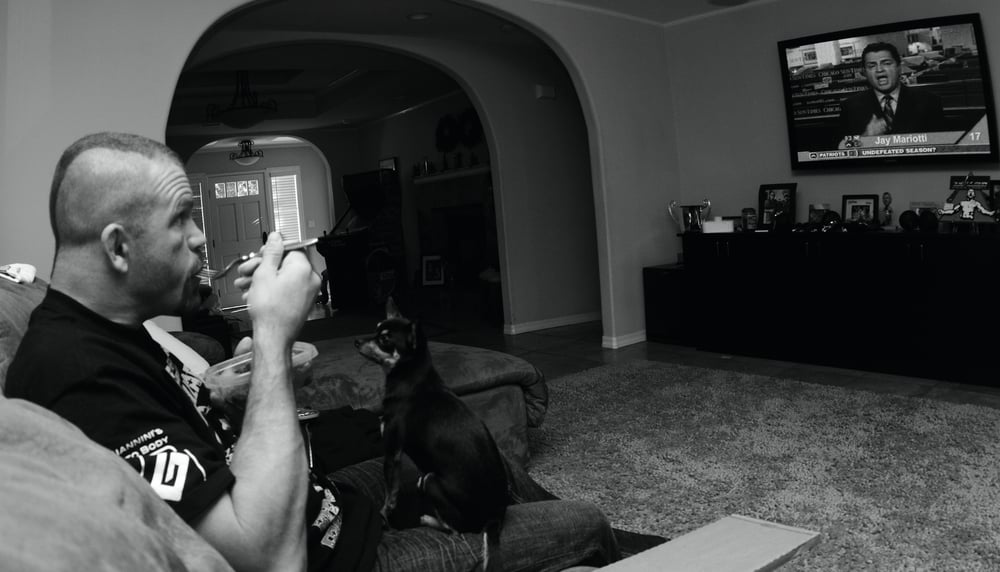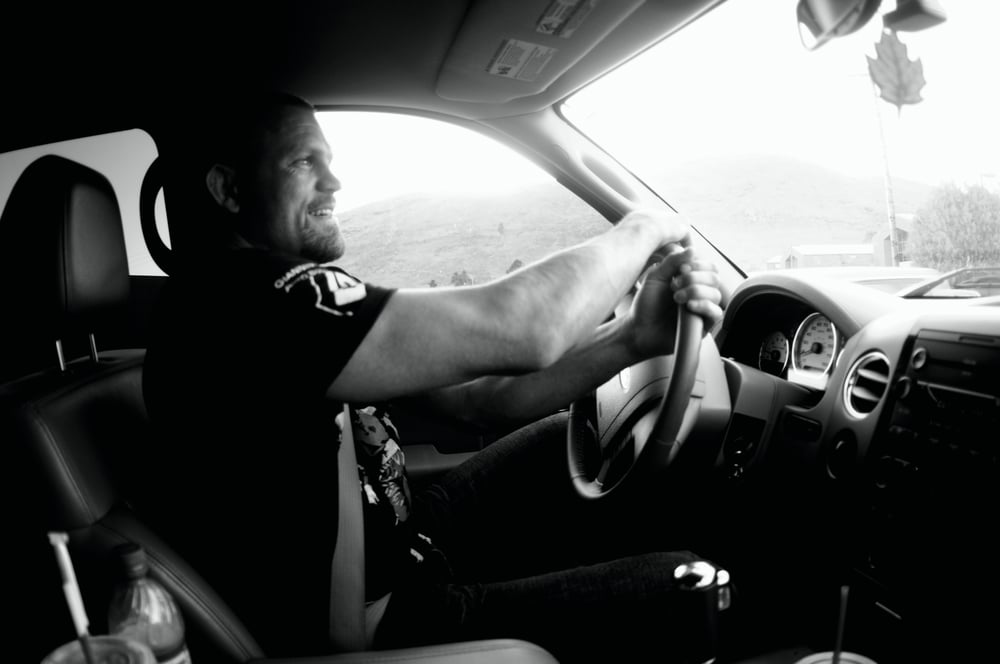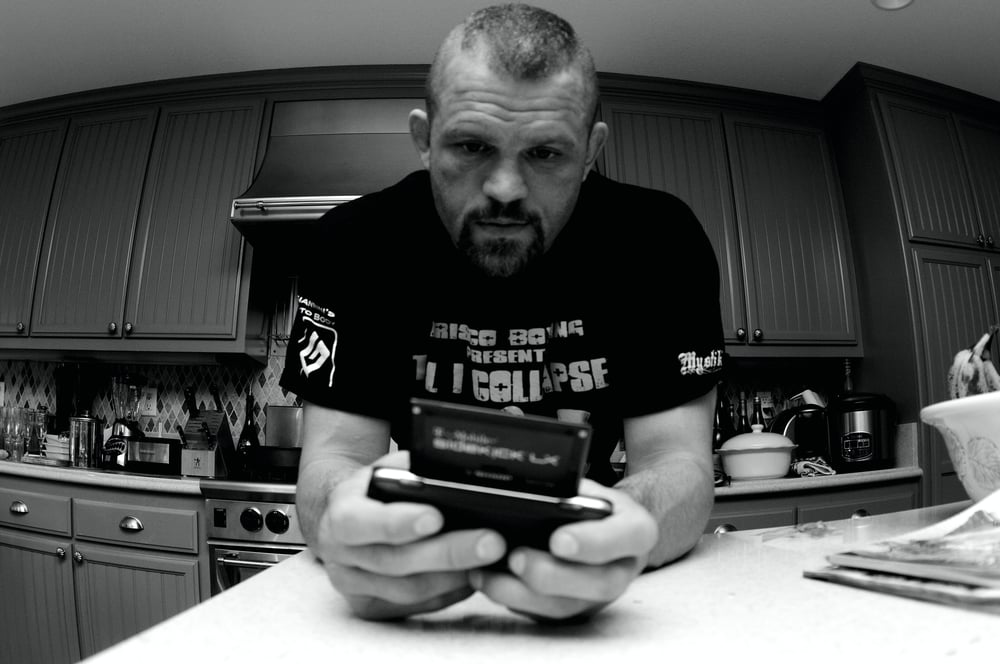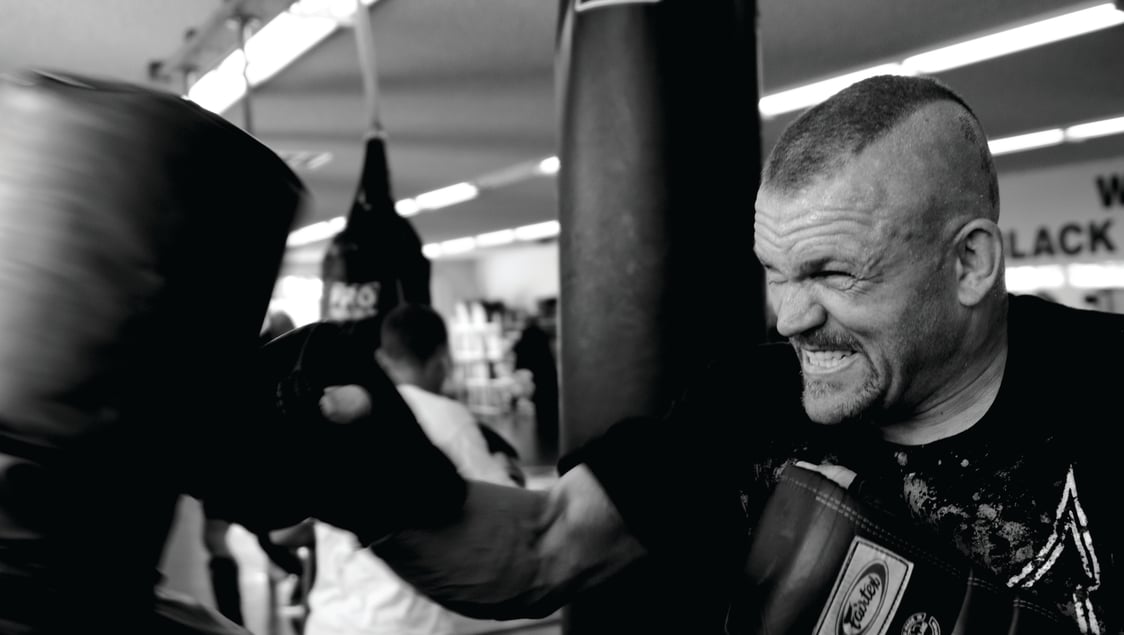
Issue 049
May 2009
An audience with a top MMA fighter is an intense experience. Time is never on your side, as they have always just come from, or are just on their way to, something or other. Meetings with sponsors, radio slots, signings for fans, training – the list goes on.
Scheduling an interview with Chuck Liddell takes this experience and amplifies it tenfold. Only pinning down Dana White compares. Chuck’s time is precious. Whenever you interview him, you’re painfully aware that any minute now he’s due somewhere, so when he sits down you had better have your tape recorder running – Chuck waits for no man.
In his usual attire of t-shirt, jeans and flip-flops, he’s the epitome of laid-back California cool. The Mohawk, the handlebar moustache and the painted toenails are as much part of his identity as his lethal left hook. Chuck dresses like he’s just come from the beach, whether he’s in London or Las Vegas.
The thing that strikes you about Liddell is that he always seems at ease. Great fighters are comfortable in their physical body in a way that normal people aren’t. Chuck doesn’t sit; he lounges. But sitting across from him you can feel an undercurrent of tension. Though he will fix you with an intense stare when you talk, he doesn’t project any sense of menace. Instead, it feels more like you are in the presence of a coiled spring, a leopard about to pounce.
He’s a raging flurry of fists when he fights, but he couldn’t be more different away from the Octagon. This is where the nickname comes from. Sure, he holds his own in the cool stakes, but the real reason he’s called the ‘Iceman’ is down to his super-chilled persona. It’s not an affected manner, either. He doesn’t work at being calm: he simply is. You get the impression that you could tell Chuck he won the lottery and he’d meet the news with a shrug.

Asked about the state of the light-heavyweight division, it is with a real aura of nonchalance he gives his thoughts.
“There are a lot of tough guys there. It’s a very competitive division and that makes for some very good, close fights. With guys like that you know there’s the chance for the title to change hands a lot.”
“So, what with all these tough guys coming through, and everyone with an eye on the title, what happens next? Do you think Rashad will stay champ for long?”
“I’m not planning on letting him stay champ for long,” he states. “So no.”
Liddell isn’t particularly happy that Rashad Evans holds the title he believes is his. He doesn’t just want to be the champion; he wants to be the champ until he retires and, as Evans has the belt around his waist, that means he has double the motivation to face him again.
The loss to Evans – a stunning second-round KO thanks to a devastating overhand right – is still fresh in people’s minds. At 39 years old, some even said that Liddell, who is 1-3 in his last four fights, should consider calling it a day. But careful how you broach this subject, as you’re likely to melt the icy demeanor.
“Even though you’ve had a massive effect on the sport in your career, are you still a player at 205lb?”
“Um, what? Is this a serious question?” he bristles. “I just beat Wanderlei before I lost one. I won one and lost one, and I thought I was winning that fight [vs Rashad]. I made a mistake, got caught and got dropped. I was winning the fight up until then. People ask me about retiring after that fight. It wasn’t like I got my ass kicked and then got knocked out. I was winning the fight, got sloppy for a second and got caught. I made a mistake.”
He argues his case well. Some might assert that Evans was feeling him out, finding his timing for the decisive blow, but Liddell is clear when he says he was dictating the fight until that point, simply becoming overconfident as the contest went on.
“I’ll maybe look back and make a few changes, he said. “I’ve got to be a little more tight with stuff, not be as loose. But I don’t see how that puts me out of contention. I can beat anybody in that weight class. Anybody. I’m dangerous for anybody.”
He’s definitely right about that. Chuck is a dangerous fighter, no doubt. Anyone who has stood in front of him in the Octagon would surely attest to that fact. He held the light-heavyweight title for over two years, and 14 of his 21 wins were by KO or TKO.
“You made four defenses of the 205lb belt, and even when you weren’t champ, you were still seen as the ‘face’ of the division for a long time. I guess this begs the question, when you fight, do you do so to get back to the belt, or just because you want to fight?”
“It’s a combination of both,” he says. “I still love fighting and I love what I do. I want to get that title back and that’s always been my goal. Since I started this thing I’ve been out to prove I’m the best 205lb fighter in the world, and I’m still out to do that.”
“A lot of people consider you as a real fighter’s fighter. You don’t pick your opponents, don’t complain if you lose, don’t make excuses – you fight, plain and simple. What motivates you?”
“The love of fighting. I love to go out there and fight. And the competition of it. It’s a pure competition for me. It’s a combination of a lot of sports I like put into one, and I think I’m pretty good at it. I’ve always been very competitive, and especially at things I think I’m good at.”

To call Liddell ‘good’ at fighting would be like saying Michael Jordan was a ‘good’ basketball player. Chuck is among, if not the, most popular of all MMA fighters. Arguably the biggest name the UFC has ever ‘made’, his level of celebrity has skyrocketed in the last few years. Dana White calls him a “rockstar”, and he has done TV and movies. Does any of the stuff that comes with being a top fighter ever get in the way of what he does, that is, fight?
“I think it can if you let it. I don’t think it does for me, I’m still pretty grounded. My fame didn’t take off until I was in my thirties. It wasn’t a big shock for me. I came from a background of kickboxing and was kind of a local celebrity in my hometown. I got pretty good coverage for local fights and stuff.”
The catalyst for his explosion in status was simple: being a coach on the TV show that would become a fan’s first taste of the sport. “The jump from before The Ultimate Fighter to after was pretty huge," he says. “Even before the TV show [TUF], people from the celebrity world would come and meet me, and they’d be shocked at how many people knew who I was, because we had so many hardcore fans. Now there are a lot more!
“I think the show was a huge factor for the UFC. It got it out there to the public where they could see it for free. It’s hard to get people to pay hard-earned money for a style of fighting they’ve never seen before. People got to know the guys and committed to it, plus it gave the sponsors an idea of how many people actually watched it.”
“How different would the sport be if Dana and the Fertittas hadn’t come along?”
“Anyone is kidding themselves if they think we’d be anywhere near where we’re at. How many guys would have taken something, I mean, they were down 40-something million, who would have invested that much money into the sport? To keep losing, hitting their head against a brick wall like that. I think there was a little bit of luck too: the reality TV show craze was our Trojan horse to get a live fight on TV – Dana didn’t even like reality shows!”
Liddell’s relationship with White is a strong one, and goes back many years. Meeting in Vegas in the late ‘90s, White became Liddell’s manager, something Liddell chuckles about, considering their current positions in the sport.
“He was on a different side back then. He was trying to get money out of the promoter, not make money for the promoter!” he laughs. “He’s always been the same though, he’s never really changed to me.

He’s one of those guys, he says what he’s thinking. You don’t always agree with it, but at least you know what he’s thinking. He’s always done what he said he would for me, he’s never lied to me. I like people who are straight with me, whether I like what they say or not, I’d rather hear it straight.”
Next for Liddell is a fight that was originally scheduled for last summer. He will meet ‘Shogun’ Rua in Montreal in April, and he’s especially looking forward to fighting north of the border.
“I’m very excited. Usually, my preferred place to fight is Vegas, but when they said Montreal I was actually excited to fight there. They’re such big fans up there. It’s such a big deal for them, they love it. I was actually disappointed I didn’t get to fight in London – I got a real good reception over there. I like the fans, so I like places where people really love the sport, and they seem to like it over there too.”
Liddell has been quite open about what he thinks about Shogun in the past. He was distinctly unimpressed with his fight against Forrest Griffin, saying that if he fought like that against him, it would be an early night for the Brazilian.
Pushed for an assessment following the Coleman fight proves tricky though – Chuck hasn’t seen it yet. “I didn’t see him fight against Coleman. I heard about it, but I had a problem with my pay-per-view provider. It was supposed to be on, but they couldn’t figure out how to get it to come on. I was at my buddy’s house, he was on the phone with the pay-per-view people for like an hour. So I didn’t get to see it, but I’ll watch it soon. We’ll be watching tapes of it. I heard he was in real bad shape, and got tired real fast. I really don’t expect him to do that for me. When he’s coming to fight me, he’s not going to be in bad shape.”
If Rua has got any sense, he’ll make sure he’s better prepared than he was in Dublin. Liddell has KO power in both fists, and the way the Brazilian was taking punches off the aged wrestler does not bode well.
It is Liddell’s vicious ability to end a fight so quickly that has won him so many fans. Though he didn’t invent it, he is synonymous with one particular aspect of MMA, namely ‘sprawl ‘n brawl’.
“I think it’s where I feel I can finish fights the best – that is, on my feet. On my feet I’ve got the best power, the best strength. I still hit takedowns every once in a while, I got away from that for a while but I’m back to doing that a lot more. I’m working with an Olympic silver medallist, he’s been helping me get my wrestling game back.”
Liddell loves to bang, everyone knows that, but from the way he’s talking, it could well be that he employs some tactics we’re not used to seeing from him. “I like to knock people out, but still, if you give it to me, I’ll take it. People forget I know the ground stuff – just because I don’t use it doesn’t mean I don’t known how to use it.”
Whatever he does next, Liddell’s legacy is secure. His status, his achievements: nobody can take that away from him. His place within the annals of history is set, so what’s left for the 39-year-old?
“What’s left for me? I just want to keep winning. I’d like to get my title back and go out on top, it’s every fighter’s dream I suppose. To end on top. I’d like to end on a nice, big winning streak.”
“So you’re still hungry, even at 39 years of age?”
“I’m still hungry. Like I said, I still love what I do. You can’t beat being paid quite a lot of money to do what you love for a living. I don’t have too bad a life.”
“But still, you’d rather be in the Octagon than in the movies or on TV?”
“I’d still rather be fighting, for as long as my body’s working. It’s been a great run. I’ve been with the sport, watched it grow, and I’ve had a lot of good experiences and met a lot of good people. A lot of great times.”
“What do you think the fans will remember you most for?”
“Hopefully my style of fighting, that I showed up to fight every time I came out. That they like the way I fight makes me happy – I try to finish fights.”
Written by Hywel Teague, with contributions from Gary Alexander










